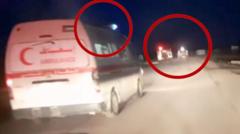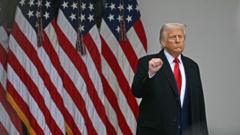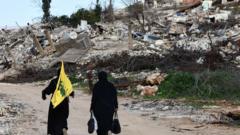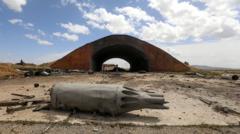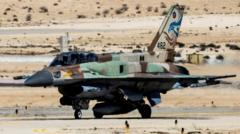Amid heightened tensions, U.S. Deputy Envoy Morgan Ortagus visits Lebanon to address the fragile situation with Hezbollah and promote stability following the devastating conflict with Israel.
Trump Envoy Pressures Lebanon for Stability Amid Tensions with Hezbollah

Trump Envoy Pressures Lebanon for Stability Amid Tensions with Hezbollah
U.S. envoy Morgan Ortagus discusses the cease-fire and Lebanon's recovery efforts following war with Israel.
On April 5, 2025, the backdrop of strife and recovery unfolded as Morgan Ortagus, the U.S. deputy envoy for the Middle East, journeyed to Lebanon to meet with key government officials amidst ongoing tensions with Israel. The visit comes against the backdrop of a U.S.-brokered cease-fire, which was established in November but is currently under strain due to recent hostilities.
In recent weeks, escalating military exchanges have put the cease-fire at risk. Following rocket fire from militants, Israel retaliated by targeting areas in and around Beirut, generating concerns that the fragile peace could collapse. The Lebanese government is managing the aftermath of a harrowing conflict with Israel and Hezbollah, where casualty estimates have reached 4,000 and displacements total nearly one million individuals.
During her visit, Ortagus engaged in discussions with Lebanon's new president, Joseph Aoun, focusing on the situation in southern Lebanon, where the Lebanese military is expected to regain control as part of the cease-fire agreement. The area has traditionally been a stronghold for Hezbollah, an Iran-backed militant group that has suffered significant reduction in power post-war yet remains influential.
While tension persists, both Hezbollah and Israel seem to be avoiding a full-blown return to war. The current humanitarian and recovery efforts are crucial, as reports indicate Lebanon incurs approximately $14 billion in damages with a pressing need for $11 billion for reconstruction, underscoring the historic impact of this conflict since the end of the Lebanese civil war in 1990.
Ortagus and Aoun explored Lebanon's financial reformation efforts, a crucial step towards securing international aid and support necessary for the country's recovery. Experts express that the prospect of foreign assistance hinges on the Lebanese government's ability to affirm control over its territory, particularly regarding disarming Hezbollah, once posing as a state within a state.
As the international community looks on, the stability and future of Lebanon hang in the balance, accentuated by the intricate dynamics of power and resistance against rising conflicts.
In recent weeks, escalating military exchanges have put the cease-fire at risk. Following rocket fire from militants, Israel retaliated by targeting areas in and around Beirut, generating concerns that the fragile peace could collapse. The Lebanese government is managing the aftermath of a harrowing conflict with Israel and Hezbollah, where casualty estimates have reached 4,000 and displacements total nearly one million individuals.
During her visit, Ortagus engaged in discussions with Lebanon's new president, Joseph Aoun, focusing on the situation in southern Lebanon, where the Lebanese military is expected to regain control as part of the cease-fire agreement. The area has traditionally been a stronghold for Hezbollah, an Iran-backed militant group that has suffered significant reduction in power post-war yet remains influential.
While tension persists, both Hezbollah and Israel seem to be avoiding a full-blown return to war. The current humanitarian and recovery efforts are crucial, as reports indicate Lebanon incurs approximately $14 billion in damages with a pressing need for $11 billion for reconstruction, underscoring the historic impact of this conflict since the end of the Lebanese civil war in 1990.
Ortagus and Aoun explored Lebanon's financial reformation efforts, a crucial step towards securing international aid and support necessary for the country's recovery. Experts express that the prospect of foreign assistance hinges on the Lebanese government's ability to affirm control over its territory, particularly regarding disarming Hezbollah, once posing as a state within a state.
As the international community looks on, the stability and future of Lebanon hang in the balance, accentuated by the intricate dynamics of power and resistance against rising conflicts.

